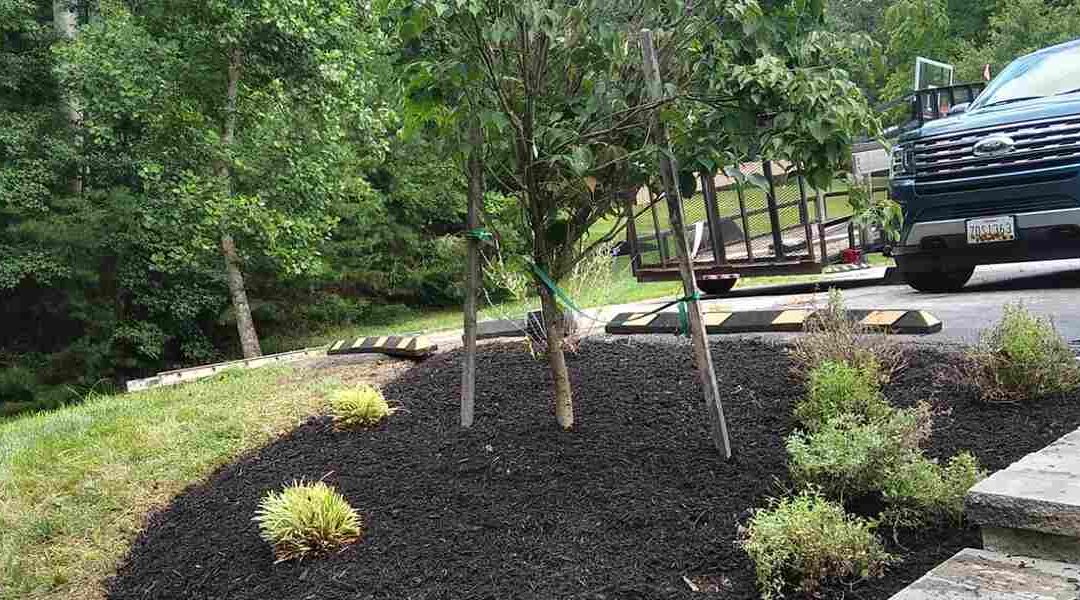The upcoming spring season excites gardeners and begs the question, should old mulch be removed? Mulch applied last fall has undoubtedly protected your soil from cooler temperatures, but will your old mulch protect your new young seedlings from harm? Depending on the type of mulch, you may not have to worry about replacing last year’s ground cover.
Gardeners have countless mulch options, from discarded wood chips to crushed stones. Thankfully, many mulches may require only minor adjustments in lieu of complete replacement this spring. This blog post outlines the importance of mulching and answers the question, should old mulch be removed?
Contact Bryans Road’s mulching experts for more information about the best mulching techniques for your flower beds, vegetable gardens, shrubs, and trees.
Understanding Mulching
Mulching has been an essential agricultural practice since ancient times. The first written evidence of mulching occurred in China during 500 BC, underscoring the value and effectiveness of refreshing garden mulch. Thanks to the widespread availability of various types of mulch and organic matter, farmers and gardeners have plenty of ways to protect their trees and shrubs from fluctuating temperatures, diseases, and insect infestations.
Some of the most popular types of mulch include the following:
- Wood chips
- Sawdust
- Gravel
- Straw
- Pine needles
- Cottonseed
- Buckwheat
A fresh layer of mulch helps retain soil moisture, protect fragile growing plants from weeds, and add essential minerals to your soil. Gardeners can add mulch twice a year, once in mid-spring and again in late fall, to protect plots from harsh UV rays and freezing temperatures. But, as temperatures rise and Larkspurs bloom, you may ask yourself, should old mulch be removed?
Removing Old Mulch
Generally, you do not have to remove last year’s mulch from your landscape. In fact, your soil may benefit from your mulch’s decomposition. However, old or neglected mulch can harm your trees, shrubs, flower beds, and gardens.
Armed with helpful information, you can answer the question, should old mulch be removed? Look out for the following signs of concerning mulch:
Fungal Infections
Fungal infections common in trees, such as Apple Scab Disease and Fire Blight, can also affect wood-based mulches. Certain fungal infections feed on decomposing wood mulches and easily spread to nearby flowers, plants, and shrubs. Fungal infections first appear yellow, orange, and red and become powdery white as summer progresses.
Insect Infestations
If you notice abundant insects crawling through your garden, you may have to remove old layers of mulch. Wood-boring insects feed on organic matter and use rotted wood to build nests, reproduce, and seek moisture. Research your area’s rules and regulations regarding safely removing infected mulches.
Improper Mulch Application
Mulch applied too closely to shallow roots and young seedlings can stifle plant growth. When asking yourself, “Should old mulch be removed?” inspect your garden for tightly packed mulch. Densely packed mulch prevents photosynthesis by blocking water and sunlight from reaching nutrient-deficient root systems.
Effective Mulching Techniques in Charles County
Always contact expert arborists for help with all your mulching projects. Professional tree services can help you with more than just tree trimming and pruning services. Services offered by highly trained tree service experts include:
- Soil quality testing
- Mulching
- Lawn care
- Landscape design
- Lawn aeration
With some planning and professional assistance, you can ensure the healthy growth of your trees, flowers, shrubs, and vegetables.
Top-Rated Tree Service Experts in Charles County
Hernandez Complete Tree Service proudly serves Northern Virginia and Southern Maryland. We offer a wide range of tree, landscaping, and lawn care services designed to beautify your landscape at an affordable price. Call Hernandez Complete Tree Service at 240-299-4639 to learn the best mulch for fruit trees and more information about, should old mulch be removed.


